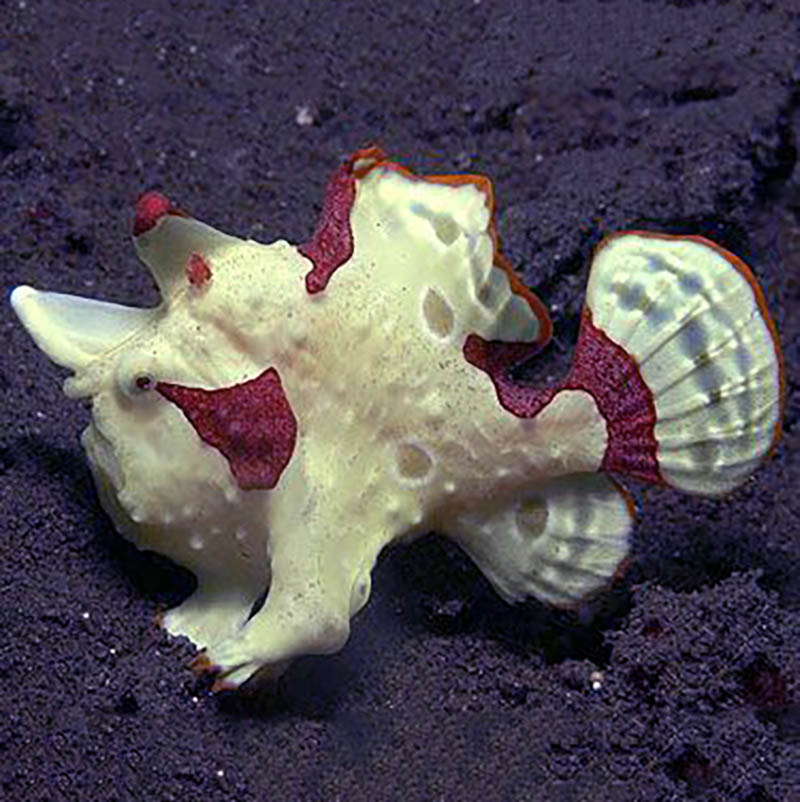The White Frogfish (Antennarius spp.) is a fascinating species known for its unique and cryptic appearance. It can reach a maximum size of around 8 inches (20 centimetres). Their body is stout and globular, covered in fleshy, warty protuberances that resemble algae or sponges. They exhibit various colour variations, including white, yellow, pink, or brown, allowing them to blend seamlessly into their surroundings. Their pectoral fins are modified into small, arm-like structures, enabling them to walk on the ocean floor.
Taxonomy
The White Frogfish belongs to the genus Antennarius, which is part of the family Antennariidae. This family includes a diverse range of species known for their extraordinary camouflage and unique hunting techniques.
Natural Habitat
The White Frogfish is typically found in tropical and subtropical marine environments. Its habitat consists of coral reefs, rocky areas, and sandy bottoms. They prefer to inhabit areas with abundant hiding spots such as crevices, coral heads, and sponges. Their cryptic appearance helps them blend in with the surrounding substrate, allowing them to ambush unsuspecting prey.
Keeping the White Frogfish Healthy:
Keeping the White Frogfish in captivity requires careful attention to water quality and appropriate tank setup. They have a moderate care level and can be challenging to maintain due to their specific requirements. Providing a well-established aquarium with appropriate hiding places, such as caves and live rock, is essential. Regular water parameter monitoring, and proper filtration are crucial to maintain optimal water conditions for their well-being.
Special Requirements and Feeding
The White Frogfish is a carnivorous species that feeds primarily on small fish and crustaceans. In captivity, they should be offered a varied diet consisting of live or frozen foods such as small shrimps, fish, and crustaceans. It is important to ensure that the food items are of appropriate size and nutritional value to meet their dietary needs. Target feeding with a feeding stick or tweezers can be beneficial to ensure that they receive enough food and to prevent competition from tank mates during feeding.
How Many Should I Keep?
Due to their territorial nature and specific care requirements, it is recommended to keep only one White Frogfish per aquarium. They are solitary creatures that prefer to establish their own territory and may exhibit aggressive behaviour towards tank mates.
Lighting Preference
The White Frogfish does not have specific lighting preferences and can adapt to a range of lighting conditions. Providing a moderate lighting level that mimics natural ambient light is generally suitable.
Suitable Tank Mates
When considering tank mates for the White Frogfish, it is crucial to choose species that are compatible with its predatory nature and can withstand its potential aggression. Small, peaceful fish and invertebrates that are too large to be considered prey can be suitable companions. However, cautious observation and careful selection are necessary to ensure compatibility and prevent any harm to tank mates.
Reproduction in the Wild
White frogfish, belonging to the genus Antennarius, reproduce through a process known as external fertilization. Males and females release their gametes into the water, where fertilization takes place. This type of reproduction is common among many marine fish species.
Breeding Antennarius spp.:
- Set up
Breeding white frogfish in captivity can be challenging and is typically done by experienced aquarists in specialized breeding programs. The setup requires a well-maintained aquarium with appropriate water parameters, including temperature, salinity, and pH, to mimic the natural environment.
- Courtship/Spawning
Courtship and spawning behaviour in white frogfish involve complex rituals. Males and females may engage in elaborate displays, including changing colours, fin movements, and body postures. Once courtship is successful, the female releases eggs, which are fertilized externally by the male. The eggs are typically buoyant and float freely in the water column.
- Rearing
After fertilization, the eggs hatch into larvae, which are tiny and transparent. Rearing the larvae is a delicate process that requires specialized equipment, such as larval rearing tanks with proper filtration and water flow. Providing suitable food options, such as copepods and rotifers, is crucial for the successful growth and development of the larvae.
Sexual Dimorphism
Sexual dimorphism in white frogfish is not prominent, and it can be challenging to visually differentiate between males and females based on external characteristics alone. However, during the breeding season, males may exhibit more vibrant colouration and engage in more pronounced courtship behaviours compared to females.
Distribution
White frogfish are naturally found in tropical and subtropical regions of the world, including the Indo-Pacific, Red Sea, and Caribbean. While there may be captive-bred and line-bred strains of white frogfish available in the aquarium trade, the original fish in the wild have a wide distribution across these regions.
Summary
The white frogfish, scientifically known as Antennarius spp., is a fascinating species with unique appearance and hunting techniques. They require specialized care and attention due to their specific habitat preferences, feeding habits, and territorial nature. Breeding white frogfish in captivity can be challenging but rewarding for experienced aquarists. They are naturally distributed in tropical and subtropical regions and may exhibit minimal sexual dimorphism. Overall, the white frogfish is an intriguing and captivating addition to marine aquariums but requires dedicated expertise to ensure their health and well-being.





Reviews
There are no reviews yet.